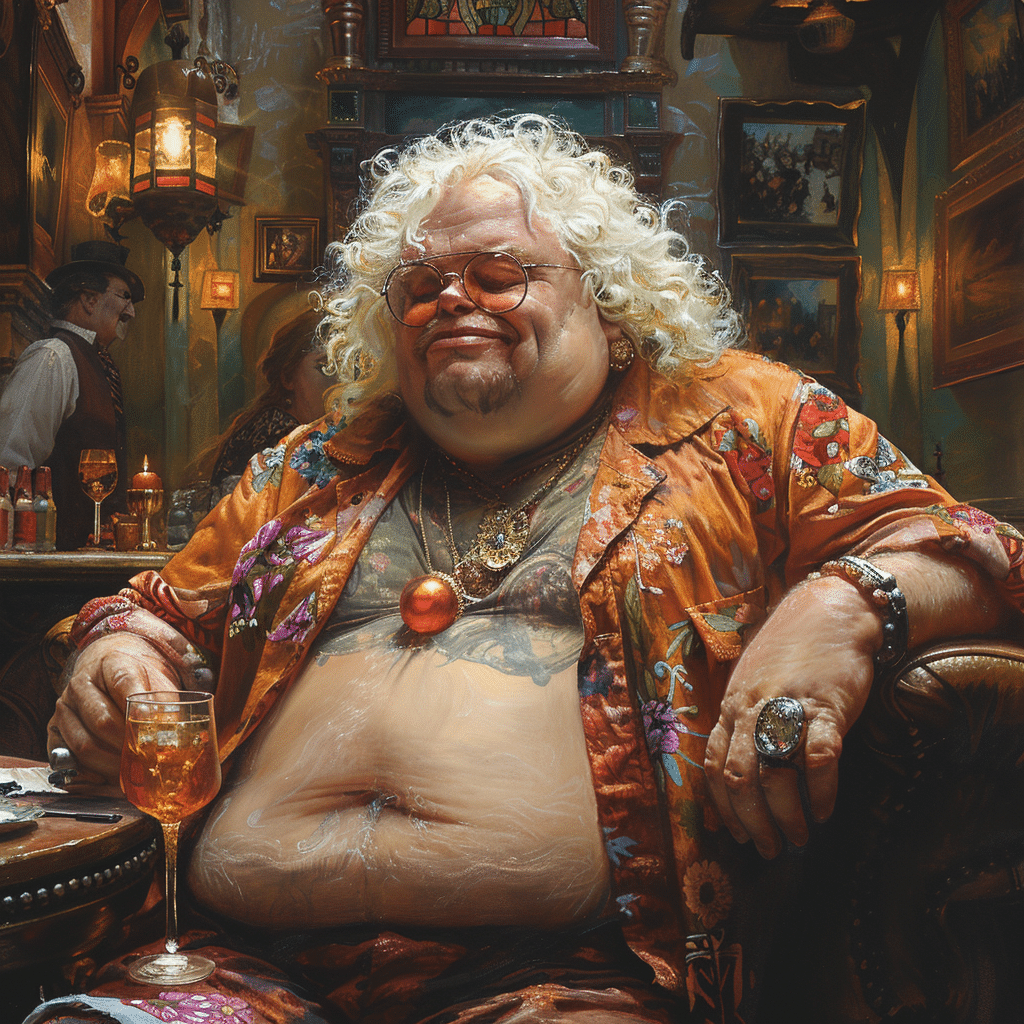Lou Pearlman: The Architect of a Billion-Dollar Deception
Let’s rip the band-aid off quick – Lou Pearlman, once a titan in the music industry, turned out to be the maestro of a grand illusion, a Ponzi scheme that rocked the world harder than the boy bands he created. But before we dive into the deep end of Lou’s swindle pool, let’s tune into the early tracks of his life.
Unveiling the Man Behind the Music: A Portrait of Lou Pearlman
Lou wasn’t your run-of-the-mill music mogul; he was more ‘Wolf of Wall Street’ than ‘That Thing You Do’. His journey to fame began humbly enough, centered in Flushing, New York. It was 1993 when the stars aligned, and Lou had a lightbulb moment, ignited by the success of the New Kids on the Block. Lou thought, “Hey, if they can do it, why can’t I?” And just like that, Lou set the stage for the Backstreet Boys. Wham, bam, and before you knew it, *NSYNC was launched, and the turning point of Lou’s career and, little did we know, his future infamy was set.
The expansion of his entertainment empire had all the makings of a Hollywood movie—fast cars, private jets, and screaming fans—except, it was plated with a counterfeit sheen.

| **Subject** | **Details** | **Date** |
|---|---|---|
| Early Career | Managed bands such as Backstreet Boys, NSYNC, O-Town, LFO, Take 5. | – |
| Notable Contributions | Created and managed some of the most successful bands of the 1990s and 2000s. | – |
| Ponzi Scheme Discovery | Investigators found Pearlman had operated a Ponzi scheme, believed to be the longest in US history at that time. | 2006 |
| Financial Fraud | Defrauded investors out of more than $1 billion, $300 million of which was never recovered. | – |
| Backstreet Boys Lawsuit | Claimed they had earned only $300,000 since 1993, whereas Pearlman had made $10 million. | 1998 |
| Legal Consequences | Pearlman’s fraudulent activities eventually led to legal action and conviction. | – |
| Death | Lou Pearlman passed away in prison, prompting a mix of emotions from former associates, including a message from Justin Timberlake. | Aug 21, 2016 |
| Impact on Music Industry | Despite criminal activities, was responsible for the formation and success of some of the most iconic pop bands. | – |
| Cultural Legacy | His role in the music industry has been a topic of discussion – controversial yet significant in the creation of pop band sensations. | – |
The Ascension: Lou Pearlman’s Rise in the Music World
Lou was the kingpin behind Trans Continental Records, where he wasn’t just hitting high notes, he was supposedly – and I say “supposedly” with a tank top worth of skepticism – constructing an entire airline from the ground up, Trans Continental Airlines. The man had the uncanny ability to spot talent. The Backstreet Boys and *NSYNC didn’t just climb the charts; they ricocheted, launching relentless hits and dance moves that defined the ’90s.
Lou’s influence on pop culture was undeniable. He had his finger on the pulse, shaking the music world’s core with every new beat his bands dropped. He was the puppet master, the big cheese, the… well, you get the picture.
The Mechanics of the Scam: Understanding Lou Pearlman’s Ponzi Scheme
So, what’s a Ponzi scheme? Picture this: You’re throwing cash into a glitzy investment, expecting the Midas touch—but the only gold you see is the façade of the sales pitch. Lou’s unique take was a blend of supposed airline brilliance with the glamour of the entertainment world—a financial Frankenstein.
He wooed investors with the allure of travel and tunes, showing off fraudulent FAA certifications and cooked books. The Trans Continental Airlines travel scam was nothing more than smoke and mirrors—a first-class ticket to nowhere.
The recruitment of investors was like watching dominoes line up, and the illusion of success was as convincing as a nurse Ratched administering a placebo—soothing, but ultimately, deceitful.

The Empire Crumbles: The Discovery of Financial Discrepancies
But no secret can stay hidden forever, not even with Lou’s Houdini charm. Whistleblowers and those pesky initial suspicions began popping up like plot holes in a B-movie script. Cue the regulators and their magnifying glasses zooming in on discrepancies that were about as glaring as Jesse eisenberg playing an action hero—we all knew something was amiss.
Legal proceedings ensued, unspooling the scale of the scam. The sweet symphony of Lou’s empire was reaching its crescendo, and the finale was about as disappointing as finding out “The Last Of Us Episode 4 was just a rerun.
The Aftermath: Impact on Victims and the Music Industry
The fallout? It wasn’t just a blip; it was a cataclysmic dent in the wallets and lives of many. Investors’ dreams crumbled like a stale cookie, and for the artists—oh, man, the artists—they were like sailors discovering their compass was a toy. Remember when the Backstreet Boys filed that lawsuit? They had been seeing chump change while Lou was swimming in a pool of Benjamins. It was cold enough to make you want to curl up and watch Candy Hulu just for some emotional warmth.
The music industry had to face the music—it’s one thing to trust your producer with your sound, it’s another to trust them with your financial future. The lesson? Keep your eyes peeled like a detective in a noir film.
The Legal Consequences: Trials and Sentencing of Lou Pearlman
2006 marked the year Lou’s legal mixtape played out in court. The chronology was stitched together like a narrative tapestry—only, this one wasn’t winning any awards. Sentencing came down like a gavel-shaped thunderbolt, and Lou was ordered to face the music behind bars.
The statements from the victims were heart-wrenching, reflecting the human cost far beyond mere numbers. After all was said and done, Lou’s life in prison ended before the reparations could ever be completed—he died in 2016, and Timberlake, being the gent he is, wished him peace in the afterlife. Tough to chew on, right?
Beyond Pearlman: The Long-term Effects of the Ponzi Scheme
Pearlman’s high-flying shenanigans clamped down the regulatory vice a few notches tighter. Investment safeguards became the new black, especially in the extravagant world of entertainment where flash can sometimes blind the rational mind.
Financial checks within the industry tightened up, no longer just a side dish but the main course. And as for the victims—bless their hearts—the ongoing search for justice continues, a relentless quest to recuperate what was so slyly swiped from their grips.
Reflections on Trust and Greed: Psychological Analysis of Lou Pearlman’s Actions
Getting into the noggin of a fraudster isn’t a walk in the park. Experts can wax poetic about profiles, but the truth is, trust in these schemes is the cornerstone—the keystone in an arch of deceitful architecture.
Ponzi schemes don’t just play with money; they toy with hope, ambition, and the quintessential human desire for more. The human cost is immeasurable, and the manipulation of hope and ambition was Lou’s magnum opus.
Revisiting the Saga: Cultural and Documentary Retellings of the Scandal
The Lou Pearlman tale has been dissected like a lab frog in the media and art. Between literature, film, and the raw journalism that keeps peeling back layers, we’re looking at a never-ending story. And let’s not forget the documentary “The Boy Band Con: The Lou Pearlman Story” that tied a neat bow on the whole debacle.
Cultural absorption of the Pearlman scandal keeps his story on replay—a greatest hits of financial fraud, playing on a sinister loop in the collective cultural jukebox.
Conclusion: The Echoes of Lou Pearlman’s Legacy
Pearlman’s story is far from gathering dust on the shelf of forgotten tales. Like “The Weeknd: The Idol,” it’s a narrative that still captures the imagination with its soap opera appeal. It serves as a constant warning—a lighthouse of caution that implores us to steer clear of the rocky shores of greed and deception.
For investors and the entertainment industry, the echoes of Lou Pearlman serve as both a lesson and a reminder. And for those affected, there’s a residual strength, a testament to the resilience of people defrauded but never defeated.
Pearlman may have slipped into the shadows, but his legacy endures like the hook of a pop song that you just can’t shake, setting the stage for a future ever wary of a repeat performance. As the curtain closes on this saga, we’re reminded that in the limelight many truths are often hidden, and only time will reveal the reality behind the glittering façade.
The Highs and Lows of Lou Pearlman’s Legacy
Once upon a time, in the not-so-far-off land of the music industry, a man named Lou Pearlman rose to fame faster than you could say “Bye Bye Bye.” But hang on tight, because this roller coaster of a tale has more loops than you’d find in a boy band’s dance routine.
From Blimps to Boy Bands
Before Lou Pearlman hit the jackpot with boy bands, he had his head in the clouds – literally! He owned a blimp advertising business. I mean, it’s not quite the average interest rate mortgage, but Pearlman’s interest in aviation was sky high. However, it wasn’t until he switched his focus from blimps to boy bands that he really started making the big bucks.
Hitting the High Notes with Backstreet Boys and ‘N Sync
You know how The Weeknd The Idol lights up the stage? Well, Lou Pearlman had a knack for spotting that star power. He launched not one, but two of the most iconic boy bands: Backstreet Boys and ‘N Sync. Talk about having the Midas touch! These guys were burning up the charts while making teenage hearts skip beats all over the globe.
The Tangled Web of a Billion-Dollar Ponzi Scheme
Here’s where things get as tangled as a poorly stored bondage rope. Just when we thought Pearlman was simply a master of pop music, it turned out he was also conducting an elaborate Ponzi scheme behind the scenes. He swindled investors out of a mind-boggling $1 billion! Pearlman had folks believing they were investing in his entertainment businesses when, in reality, he was playing a high-stakes game of musical chairs with their money.
The Downfall of an Impresario
All good things must come to an end, and for Lou Pearlman, the music stopped in 2006 when he was caught red-handed. His dance with deception landed him a 25-year stint in the slammer. It’s safe to say that even the slickest of con artists can’t escape the beat of justice’s drum.
The Aftermath
Lou Pearlman’s tale serves as a warning: even the most glittering careers can have a dark side. He might’ve been able to harmonize a boy band, but his financial dealings were horribly out of tune. Let’s face it, not everyone goes platinum, and Lou Pearlman’s legacy is a bittersweet symphony of soaring melodies and crashing cymbals.
So there you have it – a pop impresario who flew too close to the sun, and unlike his blimps, came crashing down. But let’s not end on a bum note. Instead, let’s remember the lesson Pearlman’s story teaches us: Always keep your eyes on the ball because not all that glitters is gold, especially in the music biz.

How much money did Lou Pearlman steal?
– Talk about a wallet with a hole in it—Lou Pearlman stole a jaw-dropping billion bucks, and get this, $300 million of that stash is still out playing hide and seek!
Did Backstreet Boys sue Lou Pearlman?
– You bet they did! The Backstreet Boys weren’t feeling the love, so they slapped Lou Pearlman with a lawsuit in 1998, claiming their wallets were gathering cobwebs with just $300,000 since ’93, while Pearlman was rolling in a cool $10 million.
What does JustiN Timberlake say about Lou Pearlman?
– Well, Justin Timberlake tipped his hat to Pearlman despite the drama, saying, “I hope he found some peace. God bless and RIP, Lou Pearlman,” proving there’s room for grace even in the stickiest of situations.
What boy bands did Lou Pearlman manage?
– Lou Pearlman was like the puppet master of pop, pulling the strings for the big-time heartthrobs—the Backstreet Boys, NSYNC, O-Town, LFO, Take 5, and more. The dude seriously had a boy band buffet!
Who is the richest Backstreet Boy?
– Ah, the million-dollar question—or should I say, $45 million question? That’d be AJ McLean! Looks like his bank account’s Backstreet’s back, alright!
Who is the richest in NSYNC?
– When it comes to the moolah melody, JC Chasez and Justin Timberlake might be toe-to-toe singing “This I Promise You” to riches, but it’s JT with the bigger piggy bank, sync-ing up to a cool $250 million. Cha-ching!
Who was the bad boy of the Backstreet Boys?
– AJ McLean was the one with the edge, channeling that ‘bad boy’ vibe that had fans screaming and parents raising eyebrows. Talk about living up to a rep!
Who turned down Backstreet Boys?
– Would you believe it, Tiff’s “Could’ve Been” could’ve been a Backstreet Boy? But they turned down the “I Think We’re Alone Now” singer, and boy, did that decision pay off… or what?
Why did NSYNC break up?
– “Gone” isn’t just a hit track—NSYNC said “Bye Bye Bye” to the stage when the guys wanted to chase solo dreams. Hey, even the tightest bands gotta untangle sometimes.
Was Bye Bye Bye about Lou Pearlman?
– It’s the rumor that keeps on poppin’, but nope, “Bye Bye Bye” isn’t about Pearlman—it’s just a classic break-up tune. Sorry, conspiracy theorists!
Who did Justin Timberlake apologize to?
– Remember that infamous Super Bowl flub with Janet Jackson? Yep, Justin Timberlake ate a slice of humble pie and apologized for that halftime oopsie.
Did Justin Timberlake ever apologize?
– Double down on ‘sorry’—Justin Timberlake did belt out an apology for the Super Bowl snafu. Though it took a beat, he eventually faced the music.
Is Lou Pearlman related to Art Garfunkel?
– Now wouldn’t that be a twist? But nope, Lou Pearlman and Art Garfunkel aren’t related. Just a coincidence of famous last names in the music biz.
Where is Lou Pearlman buried?
– Lou Pearlman took his final curtain call in prison and was laid to rest in an undisclosed location. So, the exact spot where he’s buried? That’s off the record.
What does NSYNC stand for?
– NSYNC doesn’t just make you wanna dance; it also stands for something—yup, the last letters of each member’s first name! Neat, huh? But hey, it’s still all about the music, am I right?










